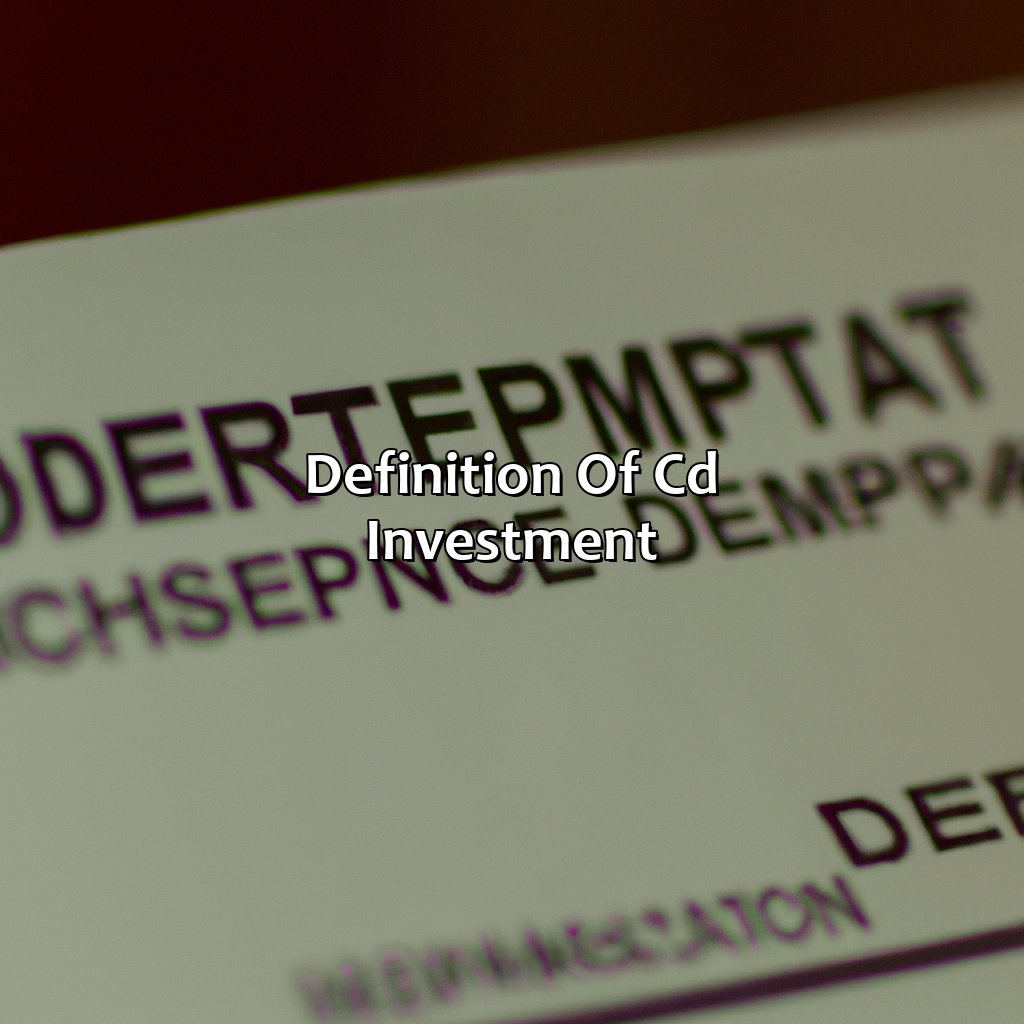What Is A Cd Investment?
Key Takeaway:
- A CD Investment is a type of savings account offered by banks and credit unions that offer higher interest rates in exchange for a fixed deposit amount that is held for a set term, usually ranging from 1 month to 10 years.
- Types of CD Investments include Traditional CDs, Brokered CDs, Callable CDs, and Bump-up CDs, each with their own features and benefits. Choosing the right CD type depends on individual goals and financial situation.
- Advantages of investing in CDs include fixed returns, low risk, and FDIC insurance, which guarantees up to $250,000 per account. However, CDs also come with considerations such as penalty for early withdrawal, inflation risk, and low liquidity.
Are you interested in learning more about CD investments? Get ready to explore the details and advantages of CD investments. You can discover the benefits of this option and decide if it is right for you.
Definition of CD Investment
A CD investment refers to a financial product that involves depositing money with a financial institution for a fixed period in exchange for a predetermined interest rate. This investment option is a low-risk way of earning interest on savings, which can range from a few months to several years. The longer the investment term, the higher the interest rate. The investment cannot be withdrawn before the maturity date without incurring a penalty, which makes it a great option for people looking to save money for a specific goal or avoid the temptation to spend their savings.
CD investments offer a guaranteed return on investment, making them a popular choice for those looking for a stable way to earn interest. They are FDIC-insured, which means that they are backed by the government, making them a safe option. One can purchase a CD investment with a minimum deposit and enjoy high-interest rates compared to conventional savings accounts. Furthermore, CD investments are flexible as they are available in various terms, from a few months to several years.
Despite being low-risk, CD investments offer lower interest rates compared to other investment options, like stocks and bonds. While they offer a stable return on investment, they may not be the best option for those looking to grow their money long-term. However, as a short-term investment option, a CD investment provides more returns than a savings account.
According to Forbes, the average interest rate for a 12-month CD investment was 0.22% as of March 2021. However, this rate can vary depending on market conditions and the financial institution offering the investment. In any case, it is essential to shop around and compare different rates before investing in a CD.

Image credits: retiregenz.com by David Woodhock
Types of CD Investment
Invest in CDs? Let’s explore the options! Traditional, Brokered, Callable, and Bump-up CDs. Each has its own unique features. Learn more about them and see how they fit into your financial plan.

Image credits: retiregenz.com by Joel Duncun
Traditional CDs
CD investments are a popular way for investors to earn steady and guaranteed returns on their money. One type of CD investment is the traditional CD, which offers a fixed interest rate over a predetermined period.
Traditional CDs are issued by banks and credit unions and typically have terms ranging from one month to five years. They require investors to deposit a set amount of money, which they cannot access until the term has expired. In return, the investor earns a fixed interest rate, often higher than what they would receive in a savings account.
Another advantage of traditional CDs is that they are insured by the Federal Deposit Insurance Corporation (FDIC) or National Credit Union Administration (NCUA), up to certain limits. This makes them a low-risk option for investors who want stability in their portfolio.
If you’re considering investing in traditional CDs, it’s important to shop around for the best rates and terms. You may also want to consider laddering your investments, which involves purchasing multiple CDs with different maturity dates. This can help ensure that you have access to at least some of your funds on a regular basis.
Don’t miss out on the benefits of traditional CD investments – shop around for rates today and start earning guaranteed returns on your money.
Finding a brokered CD is like finding a unicorn: rare, elusive, but ultimately worth it for the magical returns.
Brokered CDs
A CD investment purchased through a brokerage firm is a type of investment product that brokers offer their clients on behalf of banks and credit unions. These investments are commonly referred to as Brokered CDs.
- Brokered CDs enable investors to choose from a larger selection of banks than if they were to purchase directly.
- The investor can choose the length of time for which the CD matures, but longer-term maturities usually offer higher annual percentage yields (APYs).
- Brokered CDs can be traded on a secondary market and may have penalties associated with withdrawing funds early.
- Investors at times face additional fees, including markups, when purchasing Brokered CDs through their brokers.
- It is imperative to investigate the creditworthiness, financial stability, and regulatory standing of any bank before investing in a Brokered CD issued by that institution.
- Deposit insurance covers many types of brokered CDs, provided that they are within federal deposit insurance limits.
Specified securities that are not tradable in conventional markets are also available from some firms. It’s important to consider differing investment objectives along with terms and interest rates when selecting an appropriate instrument.
Pro Tip: It is critical to read and comprehend the fine print before participating in any investment program.
Callable CDs: Because who doesn’t love the feeling of being ghosted by their investments?
Callable CDs
Investing in a CD is an excellent way to earn money without risking it. One of the types of CDs is known as Callable CDs. These are also referred to as redeemable CDs.
Callable CD enables banks or financial institutions to pay back the investors at their discretion before the completion of the maturity period. Investors can receive higher interest rates as compensation for the risk they take on.
One important thing to consider when investing in callable CDs is that they are not as predictable as traditional fixed-rate CDs. It would be best if you considered the nature of your investments and consulted with a professional before investing in these instruments.
To maximize returns with callable CDs, investors can do thorough research about market trends and current interest rates, always trying to pick long-term investments, which typically yield higher returns, and try investing in more than one CD at a time.
If only we could all have a ‘bump-up’ option in life, like these CDs, to upgrade our situations when we see fit.
Bump-up CDs
These types of CDs have a higher initial rate than traditional CDs. The ability to bump up their CD once gives investors flexibility if interest rates trend upwards. Investors may need to pay a penalty fee if they withdraw their money early or bump up their CD too many times.
Investors can benefit from bump-up CDs’ flexibility. It is important to compare the terms and conditions between different providers before entering into an agreement.
Bump-up CDs emerged during the 1980s when inflation pushed interest rates higher, but banks were reluctant to commit long-term deposit agreements. As such, they offered bump-up CDs as a short-term solution.
CDs may not be the cool kids on the investment block, but their steady returns prove that slow and steady really does win the race.
Advantages of CD Investment
Gain insight into the perks of investing in CDs with fixed returns, low risk and FDIC insurance.
We’ll go through the benefits of choosing a CD as a secure investment option.
Learn how CDs can provide a dependable and foreseeable return on investment while lowering danger. Discover more by looking through the subsections below.

Image credits: retiregenz.com by James Duncun
Fixed Returns
A CD investment allows you to earn fixed returns on your investment over a predetermined period. These returns are typically higher than traditional savings accounts and provide a guaranteed source of income.
CDs offer fixed interest rates, which means that the rate you earn is locked in for the duration of the investment period. Unlike other investments, your returns won’t be affected by market fluctuations or changes in interest rates. This makes CDs a more secure investment option.
Additionally, CD investments can help diversify your portfolio and provide a steady stream of income. If you’re looking for a low-risk investment with predictable returns, a CD could be a good option.
Furthermore, some banks and financial institutions offer flexible terms on CDs, allowing you to choose the length of the term and withdrawal penalties if needed. However, it’s important to note that withdrawing early may result in penalties and lower returns.
If you’re looking for an investment option with guaranteed returns and low risk, consider a CD. Don’t miss out on this opportunity for steady income and added security in your portfolio.
Investing in CDs is like playing it safe in the dating game – low risk, low reward, but hey, sometimes you just want a steady return.
Low Risk
One of the most significant advantages of CD investment is its low level of risk. This means that an investor can earn a predictable return on their investment without taking on excessive risks. CDs provide a guaranteed return and are FDIC-insured, meaning the principal amount invested is safe.
Furthermore, due to the low level of risk, CDs are an excellent choice for conservative investors who want to preserve their capital and earn interest. The interest rates offered by CDs are usually higher than those offered by regular savings accounts and Treasury bills.
It’s worth noting that some higher-risk investments may offer potentially greater returns than CDs. However, these types of investments involve more significant risk and may not be suitable for all investors. By contrast, CDs offer steady and predictable growth with minimal downside risk.
To make the most out of CD investing, it’s essential to shop around for the best rates and to stagger maturity dates so that funds are available when needed. Additionally, consider laddering investments – this involves investing in several different maturity periods to spread out risk while still earning a solid rate of return.
Planning to rob a bank? Forget it, just invest in a CD and enjoy the FDIC insurance.
FDIC Insurance
Investing in a Certificate of Deposit (CD) ensures the protection of your funds through FDIC Insurance. This means that if the bank holding your CD investment fails, the FDIC will reimburse your initial deposit amount up to $250,000.
Aside from the security and peace of mind provided by FDIC Insurance, investing in a CD also offers competitive interest rates that are often higher than traditional savings accounts. CD investments lock in these rates for the duration of the term, allowing for predictable returns on investment.
It is important to note that early withdrawal penalties may apply if you need to access your funds before the end of the CD term. However, many institutions offer flexible terms and rolling options to accommodate changing financial needs.
Don’t miss out on the benefits of investing in a CD with FDIC Insurance. Speak with a financial advisor or bank representative to maximize your investment portfolio today.
Before investing in a CD, consider if you’re willing to sacrifice excitement for stability, like choosing a comfortable couch over a rollercoaster ride.
Considerations for CD Investment
Maximize your CD investment. Understand considerations involved. Know potential risks and limits before investing. Secure your money in a CD.
When choosing a Certificate of Deposit (CD), there are a few considerations to keep in mind to maximize your investment. It is important to shop around for the best CD rates, as yields can vary greatly among banks. Additionally, consider the term length of the CD and choose one that matches your investment goals.
One risk of investing in a CD is the penalty for early withdrawal. If you need to access your funds before the CD term is up, you will likely face a penalty fee from the bank. Make sure to understand the penalty for early withdrawal before investing in a CD.
Another risk to consider is inflation. While CDs offer a guaranteed interest rate, that rate may not keep up with inflation. This means that over time, your investment may lose purchasing power. Be sure to understand inflation risk and consider investing in other options to balance your portfolio.
CDs also have low liquidity, meaning that it can be difficult to access your money until the CD term has ended. If you think you may need access to your funds before the CD matures, consider other investments that offer more flexibility.

Image credits: retiregenz.com by Adam Washington
Penalty for Early Withdrawal
When it comes to CD investments, being aware of the consequences of early withdrawal is crucial. Here are some important points to understand regarding withdrawing funds before the maturity date:
- Penalties for early withdrawal can vary depending on the terms of your specific CD investment.
- The penalty can range from a percentage of the interest earned to a flat fee.
- The penalty amount will be deducted from your account balance, potentially resulting in lower overall earnings.
It’s important to note that penalties for early withdrawal can significantly impact your earnings. Therefore, it’s essential to fully understand the terms of your CD investment before making any decisions. Being aware of and planning for potential penalties can help you avoid unnecessary losses.
In summary, knowing about the penalty for early withdrawal can be instrumental in making informed decisions when it comes to investing in CDs. Don’t risk missing out on potential returns by failing to research and understand all aspects of your investment options.
Watch out for inflation, it’s like a slow-motion robbery that steals the value of your CD investment.
Inflation Risk
One of the crucial considerations for a CD investment is the impact of inflation risk on your returns. As time passes by, inflation can eat away at the value of your investment, thereby eroding your actual returns.
To mitigate this risk, it’s important to pay attention to the interest rate offered by the CD and choose one that allows you to earn returns that are higher than the current rate of inflation. Another approach is to invest in CDs with short-term maturity periods, as reinvesting at higher rates can help shield your returns from eroding due to inflation.
It’s also worth noting that while CDs generally offer a fixed rate of return, there are certain types like variable-rate CDs that can adjust their rates based on changes in inflation.
Pro Tip: Keep an eye out for special promotions or deals that banks offer on CDs as they may provide better returns or other benefits compared to regular CDs.
You may not be able to dip into your CD investment like a pool, but at least you won’t have to worry about drowning in debt.
Low Liquidity
Investments in CDs are known for their low liquidity, meaning that once you invest in a CD, you will not be able to access the funds until the maturity date without incurring penalties. This lack of flexibility may not be suitable for investors who need access to their funds during the investment term.
It’s important to note that some CDs may offer a small withdrawal window or liquidation period, but this is something that needs to be carefully considered before investing. Additionally, early withdrawal penalties can be significant and eat into any potential gains from the investment.
A possible alternative would be investing in a high-yield savings account or money market account, which offers more flexibility when it comes to accessing your funds while still earning interest.
Pro Tip: Before investing in a CD with low liquidity, make sure you have enough emergency savings set aside in case unexpected expenses arise – this way you won’t have to dip into your investment and incur penalties.
Some Facts About CD Investments:
- ✅ A CD (certificate of deposit) investment is a type of savings account that typically offers a higher interest rate than a regular savings account. (Source: Investopedia)
- ✅ CD investments usually have a fixed term, ranging from a few months to several years. (Source: Bankrate)
- ✅ Early withdrawal of funds from a CD investment may result in penalties and loss of interest. (Source: NerdWallet)
- ✅ CD investments are generally considered a low-risk investment option. (Source: The Balance)
- ✅ CD investments can be purchased through a bank, credit union, or broker. (Source: CNBC)
FAQs about What Is A Cd Investment?
What is a CD investment?
A CD investment is a type of savings account that allows you to deposit a fixed amount of money for a set length of time. In return, you’ll typically earn a higher interest rate than you would with a regular savings account.
How does a CD investment work?
When you open a CD account, you’ll choose a term length for your investment, such as six months or two years. You’ll also choose the amount of money you want to deposit. During the term, you won’t be able to withdraw the funds from your CD without paying a penalty. Once the term is up, however, you’ll be able to withdraw your original deposit plus any interest earned.
What are the benefits of a CD investment?
One of the main benefits of a CD investment is that it typically offers a higher interest rate than a regular savings account. Additionally, because your money is tied up for a set term, you may be less tempted to spend it impulsively. Finally, because CDs are FDIC-insured, you can be confident that your investment is safe and secure.
What are the drawbacks of a CD investment?
One of the main drawbacks of a CD investment is that your money is tied up for a set term, so you won’t be able to access it without incurring a penalty. Additionally, because CD interest rates are fixed, you won’t be able to take advantage of rising rates. Finally, if you need to withdraw your funds before the term is up, you may lose some or all of the interest you’ve earned.
How do I choose the right CD investment?
When selecting a CD investment, it’s important to consider factors such as the interest rate, term length, and penalties for early withdrawal. You should also consider whether you want a traditional CD, which earns a fixed interest rate for the full term, or a flexible-rate CD, which allows you to adjust your interest rate during the term.
What happens when my CD investment matures?
When your CD investment matures, you’ll have a few options. You can withdraw the full amount, including any interest earned, and close the account. Alternatively, you can roll the investment over into a new CD account. Some banks may even offer to automatically renew your CD for a new term.
